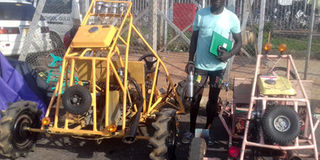Self-taught P7 dropout makes ‘car’

Leku stands around go carts that he has developed using guides from books and online websites. Photo by Julius Ocungi
What you need to know:
- Leku is a P7 dropout with no mechanical experience. However, his innovations tell of a self-taught young man who has gone on to make himself a name in Gulu, writes Julius Ocungi.
The story of Ivan Leku, 24, is an intriguing one. It tells of a self-taught young man who has drafted his name among innovators.
Leku dropped out of school in Primary Seven before becoming a street child and later joining an orphanage in Kampala.
However, his turnaround is an amazing tale that will for years be a talking point.
On a bright weekend I meet Leku seated inside one of his innovations – a two-seater go cart – conveniently placed in the parking yard of Gulu Main Market.
My instincts are quickly drawn to a book he is holding authored by Red Falcons Ventures, a guide for making go-carts.
“How are you sir,” I extend my hand to greet him as he returns the favour with a firm grip.
“I have been reading this book. It is one of my guides,” he says, wiping sweat off his forehead with a bare palm.
“How do you read?” I ask curiously to understand how a Primary Seven dropout is able to read and comprehend complex procedures.
“I have struggled to understand these things. Most of them are scientific terms but I taught myself,” he says.
Leku grew up in St Mary Kevin Orphanage, where he studied before opting for a life on the streets.
He later moved to Jinja but shortly moved back to Gulu Town in 2010, where he had previously lived with his grandmother.
In Gulu Leku developed an idea that was inspired by one of his friends from UK in 2015.
“A friend gave me a small street motorcycle. But its engine was so weak. It kept breaking down and I would visit the mechanic frequently. It is these visits that gave me the interest in mechanics,” he says.
Leku started with a few adjustments on his bike that later morphed into real innovations of the go-cart.
Some of the adjustments, he says, were a product of online websites that has information on how to build a go carts.
“Every day I would spend time studying different shapes and forms of go-carts. The project proved tough because it required a lot of money,” he says.
However, at the close of 2015 he had worked out on the mechanics that included purchasing an engine, round and flat bars, plates, head and tail lights and tyres, among other equipment that cost him Shs3m, which he had been saving from selling artworks and odd jobs.
After more than two years Leku, in April 2017, put out his fist go cart that he tested on the streets of Gulu Town.
“I drove the cart in town [Gulu] and everyone was mesmerised. Many people gathered when I finally parked on a road side,” he says.
However, the cart later suffered mechanical setbacks due to poor wheel alignment, bad break systems and unstable steering wheel.
“I had to go back to my book and online guides to correct the mistakes as well as putting some other new adjustments,” he says.
Leku has so far built three more carts with the capacity to carry one passenger and the driver.
His plan is to build go carts for sell, which if they are allowed to get on the road, by police and district authorities, will cost about Shs1.5m.
However, it has not been easy for Leku as he has on two occasions been arrested by traffic police for riding an unlicensed automobile.
Future plans
According to Leku, his immediate plan is to modify the current carts from manual to an automated machine.
Apart from this, Leku also intends to return to school to sharpen his mechanical engineering skills to allow him build first-class carts.


